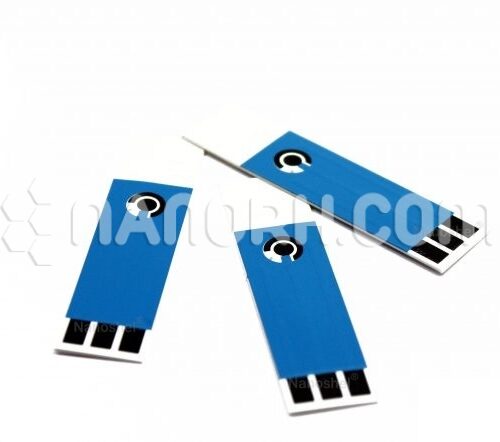| Carbon Screen Printed Electrodes | |
| Product No | NRE-49001 |
| CAS | NA |
| Diameter of WE | 2 mm |
| Size of RE | 0.5 x 1 mm |
| Ratio CE/WE Surface Area | 4/1 |
| The thickness of Coated Material | 10 µm |
| Shape | Rectangle |
| Overall Dimension | 50 x 10mm |
| Working Electrode | Platinum |
| Substrate | Valox FR1 |
Carbon Screen-Printed Electrodes
Carbon screen-printed electrodes (SPEs) are versatile tools used in a wide range of applications due to their convenience, cost-effectiveness, and versatility. These electrodes are produced by screen-printing conductive carbon ink onto a substrate, typically plastic or ceramic, to create a functional electrode surface.
Electrochemical Sensors
Biosensors: Carbon SPEs are widely used in biosensors for detecting biological molecules such as glucose, lactate, and DNA. They are often employed in medical diagnostics and health monitoring.
Chemical Sensors: They can detect various chemicals, including environmental pollutants, toxins, and pharmaceuticals. They are used in environmental monitoring and safety applications.
Food Safety: Utilized to detect contaminants and ensure the quality and safety of food products.
Environmental Monitoring
Water Quality Testing: Carbon SPEs are used for detecting contaminants in water, including heavy metals, pesticides, and industrial pollutants.
Air Quality Monitoring: They can measure atmospheric pollutants such as ozone, nitrogen dioxide, and particulate matter.
Medical Diagnostics
Point-of-Care Testing: They are used in portable diagnostic devices for rapid and on-site testing of various health markers.
Electrochemical Assays: Applied in assays for detecting biomarkers, including glucose monitoring for diabetes management.
Energy Storage and Conversion
Supercapacitors: Carbon SPEs are used in the development of supercapacitors for energy storage applications due to their high surface area and conductivity.
Batteries: They serve as electrodes in various types of batteries, including lithium-ion and zinc-carbon batteries.
Chemical Synthesis
Electrolysis: Used in electrochemical synthesis processes to facilitate the production of chemicals and materials through electrolysis.
Electrocatalysis: Applied in catalyzing chemical reactions, including fuel cell reactions and hydrogen production.
Pharmaceutical Industry
Drug Screening: Carbon SPEs are used in drug discovery and screening processes to evaluate the interaction between drugs and biological targets.
Pharmacokinetics: Employed to study the pharmacokinetics of drugs, including their metabolism and interaction with biological systems.
Research and Development
Electrochemical Studies: Used in electrochemical research to study redox reactions, corrosion processes, and material properties.
Material Characterization: Employed in characterizing and analyzing new materials and their electrochemical behavior.
Industrial Applications
Quality Control: Used in quality control processes for monitoring and ensuring the consistency of industrial products.
Process Monitoring: Applied in monitoring chemical processes and reactions in industrial settings.
Consumer Electronics
Wearable Devices: Incorporated into wearable electronics for health monitoring and fitness tracking, providing real-time data on various physiological parameters.
Smart Packaging: Used in smart packaging technologies for monitoring the freshness and quality of packaged goods.




